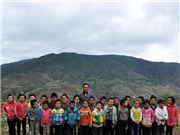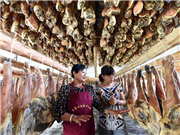

Delivered at the Third Session of the Twelfth National People’s Congress on March 5, 2015
National Development and Reform Commission
Fellow Deputies,
The National Development and Reform Commission has been entrusted by the State Council to submit this report on the implementation of the 2014 plan and on the 2015 draft plan for national economic and social development to the Third Session of the Twelfth National People’s Congress (NPC) for your deliberation and for comments from the members of the National Committee of the Chinese People’s Political Consultative Conference (CPPCC).
I. Implementation of the 2014 Plan for National Economic and Social Development
Last year, in the face of a complex and volatile environment abroad and arduous and formidable tasks involving reform, development, and stability at home, all regions and government departments, under the correct leadership of the Central Committee of the Communist Party of China (CPC) and the State Council, adhered to the general work guideline of making progress while ensuring stability; followed a general philosophy of keeping macro policies stable, making micro policies flexible, and meeting basic needs through social policies; and made coordinated efforts to ensure steady growth, advance reform, make structural adjustments, improve the standard of living, and guard against risks. We earnestly implemented the 2014 Plan for National Economic and Social Development approved at the Second Session of the Twelfth NPC, carried out our tasks in a sure and steadfast fashion, and achieved good results in all respects. Overall, we sustained steady economic and social development under a new normal and successfully implemented the plan for 2014.
1. We strengthened and improved macro-control and ensured steady economic performance.
We created new and improved ways of carrying out regulation at the macro level, took more targeted measures and enhanced structural adjustments on the basis of range-based regulation, and ensured that the economy performed within an appropriate range.
1) The economy grew steadily.
Fully leveraging the fundamental role of consumption in driving economic growth, we implemented a comprehensive range of policies aimed at boosting consumer spending. Total retail sales of consumer goods for the year rose by 12% and consumption in information, elderly care, health, and other service sectors grew rapidly. Making good use of the key role of investment, we launched major projects in ecological conservation and environmental protection, clean energy, agriculture, and water conservancy, and made innovations in the mechanisms for investment and financing in key areas. Total fixed-asset investment for the year rose by 15.3%, of which 64.1% came from nongovernmental sources (excluding rural households). Giving play to the supporting role of exports, we worked hard to stabilize exports while increasing imports. The total volume of US dollar-denominated imports and exports for the year rose by 3.4%, and our international market share continued to rise. Final consumption, capital formation, and net exports were responsible for 51.2%, 48.5%, and 0.3% of economic growth, respectively. The gross domestic product (GDP) reached 63.6 trillion yuan, an increase of 7.4% over the previous year.
2) The employment situation remained stable.
We continued to implement a more proactive employment policy, relying on reform, economic growth, and sound policy measures to create and secure jobs. A particular emphasis was placed on supporting university and college graduates in finding jobs or starting their own businesses, and on providing job seeking assistance for urban residents who are unemployed or having difficulty finding jobs. An additional 13.22 million urban jobs were created throughout the year. The registered urban unemployment rate stood at 4.09% at the end of 2014.
3) Price growth slowed.
The consumer price index (CPI) rose by 2% for the whole year. We tightened oversight over market prices and stepped up efforts to counter monopolistic pricing, dealing with 25,000 cases of pricing irregularities and imposing economic penalties of 4.47 billion yuan. We abolished a host of unreasonable charges and fees levied by banks and other financial institutions, saving enterprises more than 40 billion yuan.
4) Fiscal and financial risks remained at a controllable level.
We strengthened and standardized the management of local government debt, reviewed and screened outstanding debts, launched trials for local governments to issue their own bonds and repay their own debts, and strengthened risk assessment and early warning initiatives. Focusing on industries with overcapacity, local government debt, informal credit, and Internet banking, we intensified efforts to monitor, assess, and identify risks with a view to preventing regional and systemic financial risks. In response to fluctuations in the real estate market, we promptly adjusted and improved housing-related financial policies and improved related financial services.
 |
Day|Week

 Tsinghua junior makes over 10,000 yuan a day by selling alumnae's used quilts
Tsinghua junior makes over 10,000 yuan a day by selling alumnae's used quilts Graduation photos of students from Zhongnan University
Graduation photos of students from Zhongnan University A school with only one teacher in deep mountains
A school with only one teacher in deep mountains Glimpse of cultural heritage "Xilankapu"
Glimpse of cultural heritage "Xilankapu" Homemade cured hams in SW China
Homemade cured hams in SW China Breathtaking buildings of W. Sichuan Plateau
Breathtaking buildings of W. Sichuan Plateau Graduation photos of "legal beauties"
Graduation photos of "legal beauties" Top 10 most expensive restaurants in Beijing in 2015
Top 10 most expensive restaurants in Beijing in 2015